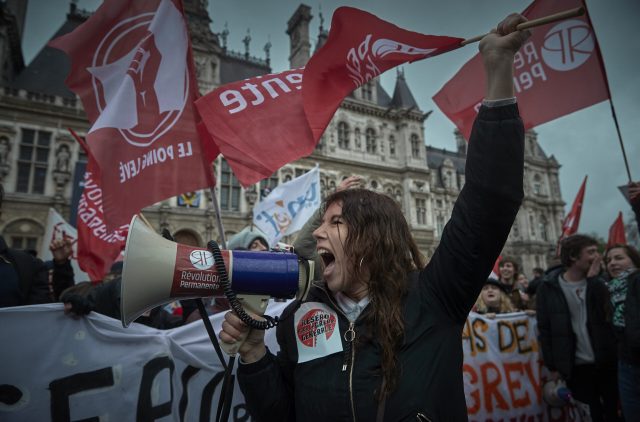
Despite significantly boosting its voter base to unprecedented levels, growing from 9 million in the first round to over 11 million in the second (a landslide if one were to only take the popular vote into equation), Marine Le Pen’s party failed to gather an absolute majority. Blame it on the fear-mongering, blame it on the “backstage deals” between NPF (New Popular Front) and Macron’s governing Renaissance party to strategically withdraw candidates, but it does not matter in the end. The results have been certified and France’s parliament is hung.
Even worse, from the ashes of the political battle, the leftist NPF came out with most of the seats (182), immediately calling for the opportunity (granted by the President of the republic, if he so wishes) to form a minority government. Their call was accompanied by street protests from the already internet-famous crowds of French leftists, immigrants and some of their established agitprop organizations.
The leftist coalition, a motley crew of communists (PCF), greens (EELV), social-democrats (PS) and the authoritarian-populist France Unbowed (LFI) led by Jean-Luc Mélenchon, did not receive its wished-for mandate. Not right now, at least. And to be precise, even if Macron would have wanted to grant them the chance to name a prime-minister (he doesn’t), the leftists still do not have a name for him or her, being caught up in their own internal conflicts.
To many Europeans, such a scenario would sound rather familiar, parties usually having to share power in multi-colored parliaments in order to form a coalition government that broadly represents the interests of 50% + 1. Germany, Italy, Romania, the Czechs, are examples of systems designed this way, even if, rarely, a broad right-wing or left-wing coalition takes power. But France was not designed as such. A combination of voter mentality and the two rounds uninominal voting system almost always guaranteed a very strong majority for one party or the other.
In a letter to the French public, which subtly underlined the fact that Macron will not hand the leftists the chance of putting together a minority government, he stated that: “You called for the invention of a new French political culture”. Most researchers and journalists agree with the statement, a parliament almost-equally split between three forces being an extremely rare case in the history of France.
True to form, Mélenchon swiftly criticized Macron’s message, labeling it a “royal veto” designed to block the left from governing France. But why should it govern? Who should govern?
Some leftists from The Front might be in luck, but not all of them. The President (who, again, appoints the PM) called for a “republican” and pro-European coalition. He did not name names, so analysts quickly jumped to explain the phrasing.
Some speculate Macron desires a broad governing alliance that would include the LR (seen by him as a moderate right), his presidential party (of course) and the more moderate elements of the New Popular Front, respectively the greens and socialists. Practically, this would mirror the EPP-Renew-S&D coalition in the European Parliament, but in national terms.
However, the air of intrigue is thicker in Paris than in Bruxelles, and the keenness to compromise is objectively lower. Such a broad construction would have a very shaky foundation, due to many disagreements on policy (especially migration and the economy).
The second scenario viewed as palpable by scholars and pundits is a technocratic government, not ruling but rather managing France for the foreseeable future, while the major decisions on divisive issues are left to be pronounced in parliament. This scenario would allow more flexibility, since alliances of circumstance could form on specific issues.
All in all, the coming weeks bring more questions than answers. Will the French political class embrace cooperation and compromise? Will Macron give the left a chance to govern in hopes that the enthusiasm will quickly burn out when fanned by the winds of reality? Is a technocrat coming?



 Subscribe
Subscribe